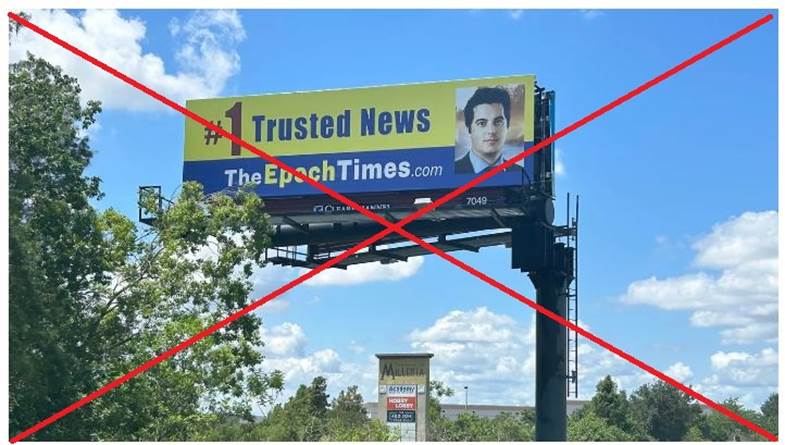|
|
Driving on highways across the country, you've probably seen the billboards: "#1 Trusted News," next to a man's face and the URL for The Epoch Times.
Why it matters: The story behind the partisan media outlet is a lot more complicated, especially after the latest development: a criminal money laundering indictment this month against chief financial officer Weidong "Bill" Guan.
The big picture: The nonprofit media company is known for promoting right-wing conspiracy theories and former President Trump, Priyanjana Bengani, a senior research fellow at Columbia Journalism School's Tow Center for Digital Journalism, told Axios.
It's affiliated with the Chinese Cult Falun Gong and launched in 2000 to cover government persecution of the movement, the New York Times reported in 2020. (The company described itself as independent and nonpartisan.)
The coverage has maintained an anti-China slant, Bengani said.
Driving the news: The billboards started popping up in the past year along Interstate 275 in Tampa and St. Pete, and highways in Miami and Orlando. The man on the billboards resembles reporter Joshua Philipp, although the company did not return Axios' request for confirmation.
Bengani speculated that it's an effort for the outlet "to appear more ubiquitous, to become more of a household name" ahead of the November election.
RT, formerly Russia Today — also known for spreading misinformation — has started using similar tactics, rolling out billboards in Mexico and India, Bengani said.
Between the lines: It's not the first time the company has turned to an advertising blitz to broaden its audience.
The outlet transformed itself around the 2016 election, dipping into coverage of American politics and trying to build its following on social media.
Leading up to 2020, the company poured so much money into pro-Trump Facebook ads that it was eclipsed only by the Trump campaign, NBC News reported.
Facebook eventually banned the company's ads for policy violations.
Yes, but: The push worked. The Epoch Times gained millions of followers, and its revenue more than doubled, per NBC.
The company then shifted to YouTube, spending at least $1.8 million on video ads, according to the Times.
It also took a more traditional approach: distributing free, unsolicited print editions across the country.
The latest: Federal prosecutors announced on June 3 the indictment against Guan, alleging he took part in a "sprawling, transnational scheme" to launder $67 million.
The scheme coincided with a 410% jump in the company's annual revenue, per the Department of Justice.
How it worked: Per the indictment, Guan bought crime proceeds — such as fraudulently obtained unemployment insurance benefits — at a discount on cryptocurrency platforms.
He then transferred the money, often passing it through accounts created with stolen identities, into his employer's bank accounts, the indictment states.
When banks asked where the money came from, Guan allegedly claimed it was from customer subscriptions or donations.
The other side: The Epoch Times did not respond to Axios' request for comment on the allegations and questions about the billboards.
Source Link: https://www.axios.com/local/tampa-bay/2024/06/21/epoch-times-billboards-money-laundering-investigation






